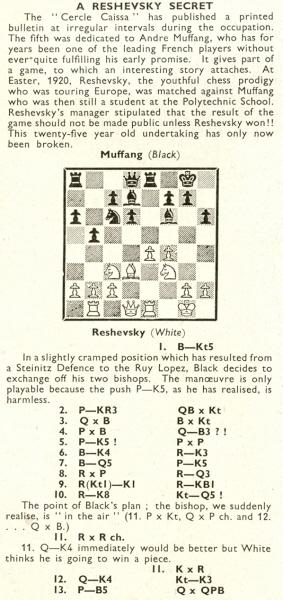
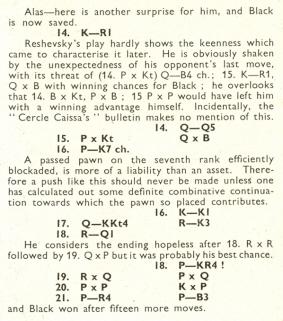
Edward Winter
An extract from a letter sent by Harry Woolverton to Newsflash (see July 1984 issue, page 6):
‘It is not generally known that Aitken played a match with the veteran Mieses in 1947 which he won by 5½-1½. In deference to the feelings of the old master the result was never published. I watched the second game, which was played at the Ilford Chess Club; a collection was made at the time for the veteran.’
(787)
Other instances are requested. It is believed that Staunton and Morphy played privately (at the former’s wish). CHESS, April 1945, page 113, reported that at Easter 1920 Reshevsky played a game against the student Muffang. ‘Reshevsky’s manager stipulated that the result of the game should not be made public unless Reshevsky won!! This 25-year old undertaking has only now been broken.’
(996)


Dominique Thimognier (St Cyr sur Loire, France) provides the original text in issue 5 of Caïssa (1944):
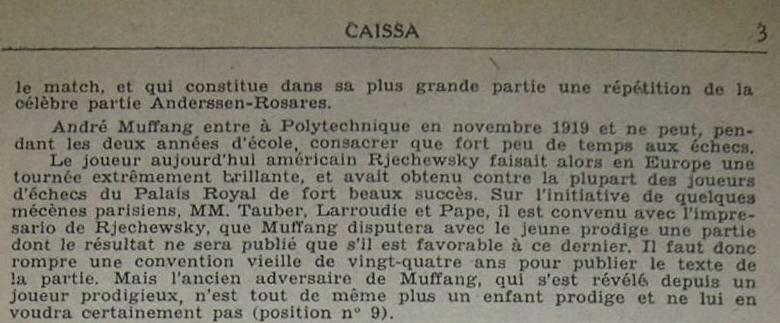
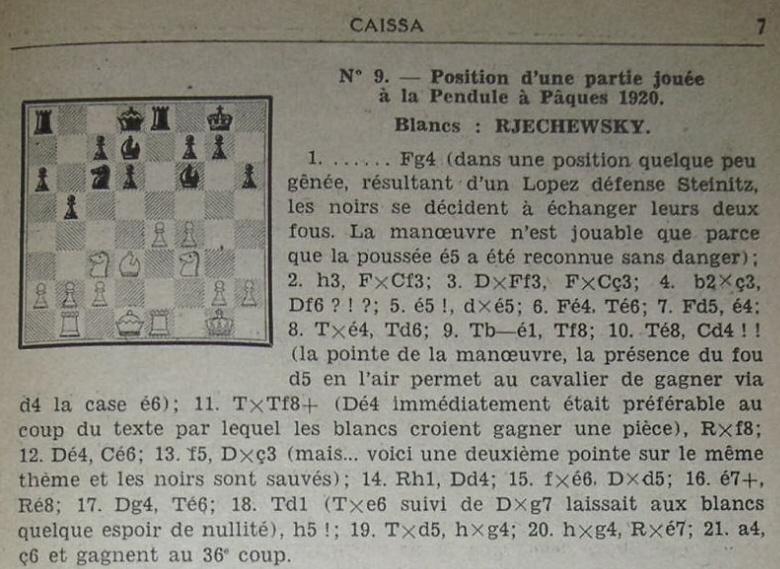
(5233)
In the ‘secret game’ between Reshevsky and Muffang the moves are available only as from this position:
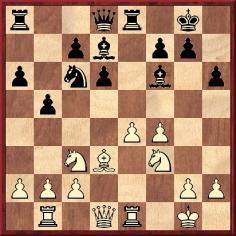
We have received from correspondents two reconstructions of the opening phase (other possibilities exist, of course):
(5255)
Also on the subject of Reshevsky, below is an extract from the article ‘Some Chess Memories’ by Constantine Rasis on pages 105-106 of Chess Life, April 1963 (C.N. 10188). The Western Chess Association tournament was held in Detroit from 23 August to 2 September 1924.
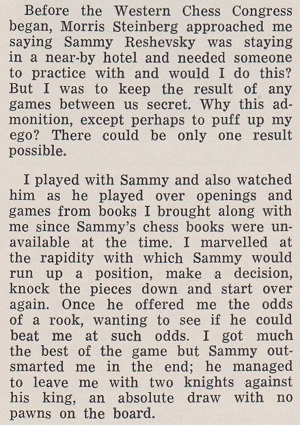
(10298)
Page 16 of Complete Games of Alekhine, volume 2, by V. Fiala and J. Kalendovský (Olomouc, 1996) refers to a four-game match between Alekhine and Bogoljubow played in Triberg in June/July 1921:
‘Alekhine and Bogoljubow wrote down an agreement pledging that the results would not be published in the next 15 years. ... Bogoljubow himself confirmed the existence of the secret match (which ended in a draw +1 –1 =2) only many years later. It was mentioned in the Introduction to the collection of games from the [1934] world championship match against Alekhine. In their lifetime neither protagonist made public mention of any game of this match.’
The book gives the four game-scores.
(2156)
Mark Nieuweboer (Moengo, Surinam) points out a report in Alexander Münninghoff’s book on Max Euwe (pages 155-156 of the Dutch original and page 112 of the English edition) that in 1935 the Dutchman played, in preparation for his world championship contest against Alekhine, a secret ten-game match against Rudolf Spielmann. Below is the relevant text, for which no corroborative source is supplied by the book:
‘… just before the final secondary school exams he met Spielmann for a drawing-room match. This latter piece of practical training went quite badly for him; we don’t know whether he found it hard to concentrate because of his schoolwork or whether he had underestimated Spielmann, who was clearly past his prime as a chessplayer, but the fact remains that the peripatetic Austrian veteran claimed this secret ten-game match in fairly superior style with 6-4 (+4 –2 =4).’
None of the games would seem to have been published.
(3194)
Alan McGowan (Waterloo, Canada) quotes three reports from 1935 which show that the existence of the match was not a secret and that, moreover, there is no unanimity as to who won the contest:
1) From page 402 of the September 1935 BCM:
‘In preparation for his match for the world championship, Dr Max Euwe has had a practice match with R. Spielmann, whom he beat by 4-2, with 2 draws.’
2) Pages 282-283 of Deutsche Schachblätter, 15 September 1935 also referred to the Euwe v Spielmann match, without giving the result:
‘Der holländische Vorkämpfer nimmt den Kampf sehr ernst; so hat er sich in Trainingskämpfen mit Spielmann und Eliskases geschult und in Wien theoretische Studien getrieben.’
3) The December 1935 Wiener Schachzeitung had an article reviewing the past year, and on page 354 it was stated that Spielmann had defeated Euwe:
‘... in einem Übungswettkampf schlug er Euwe 4:2 ...’
We can add that in De Groene Amsterdammer (an article reproduced on pages 185-186 of the June 1935 Tijdschrift van den Nederlandschen Schaakbond) Salo Landau wrote that Euwe and Spielmann were playing a training match in the absence of the press and witnesses, so that Alekhine would not have the benefit of seeing the games:
‘Het is bekend, dat Euwe op het oogenblik een oefenmatch speelt met Spielmann. Pers noch toeschouwers worden hierbij toegelaten, uit vrees, dat Aljechin de partijen te zien zal krijgen en daardoor het geheim der vorderingen van den Nederlandschen kampioen te weten zou komen.’
Can readers shed further light on the Euwe v Spielmann match?
(4174)
Another case, involving Spassky and Karpov, was mentioned by the latter in an interview with Irwin Fisk posted by ChessBase on 2 March 2015:
‘I.F.: Spassky was in preparation to play Fischer for the world championship. Had you played Spassky?
A.K.: Yes, I played a training match with Spassky. He asked me to play training games, but we played only one game. Spassky won this game even though he had a lost position, but I made a stupid mistake, and after this suddenly Spassky said he didn’t want to continue this training match, so maybe he was happy he beat me in that game.
I.F.: Where was this game played?
A.K.: We were near Moscow.’
A similar, though more detailed, account is on pages 98-99 of Karpov on Karpov (New York, 1990):
‘Toward the end of the camp, Spassky, wishing to check his form, decided to play several games with me. In the first game, he selected the Ruy López. I played White and quickly gained a winning position. All I had to do was hold on to it for a little while longer, but, weary from the previous inactivity and irritated by how I was being treated, I decided to show off and embarked upon unnecessary tactical complexities. This gave Spassky a chance to display his customary resourcefulness. I should have regrouped in time, changed the arrangement, and played to at least hold on to what remained. But I already realized my lead was receding, and I overplayed and lost. Spassky liked this game. He decided that his form was superior and there was no reason to continue checking it. My participation in his final prematch training was virtually limited to this one game.’
On page 8 of the September 1989 Chess Life A. Soltis disseminated a different version:
‘In some instances, no details about a match are ever disclosed. Or a smidgen of information surfaces, such as after the 1972 world championship match, when Anatoly Karpov confirmed the rumors that he had played a match to help prepare Boris Spassky for the challenge of Bobby Fischer. All Karpov would say then about the result was “I did not lose”.’
A similar text appeared on page 148 of Soltis’s book Karl Marx Plays Chess (New York, 1991), but in neither case did he offer the reader any source. It is possible that he was relying on a mere rumour published, as an editorial end-note, on page 70 of the February 1973 Chess Life & Review:
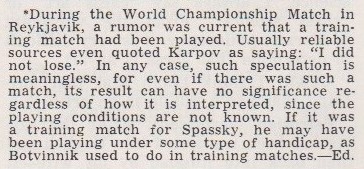
(9361)
Joop Elderhorst (Rotterdam, the Netherlands) writes:
‘In Summer 1979, Timman and Polugayevsky played a secret match in the Netherlands in preparation for their respective Interzonal tournaments (Timman in Rio de Janeiro and Polugayevsky in Riga). Timman won +2 –1 =5 and discussed the match on pages 3-20 of the October 1979 issue of Schaakbulletin.
Donner wrote an article about the event in De Volkskrant, 11 August 1979; see pages 314-317 of his book The King (Alkmaar, 2006).’
(9367)
To the Chess Notes main page.
To the Archives for other feature articles.
Copyright: Edward Winter. All rights reserved.